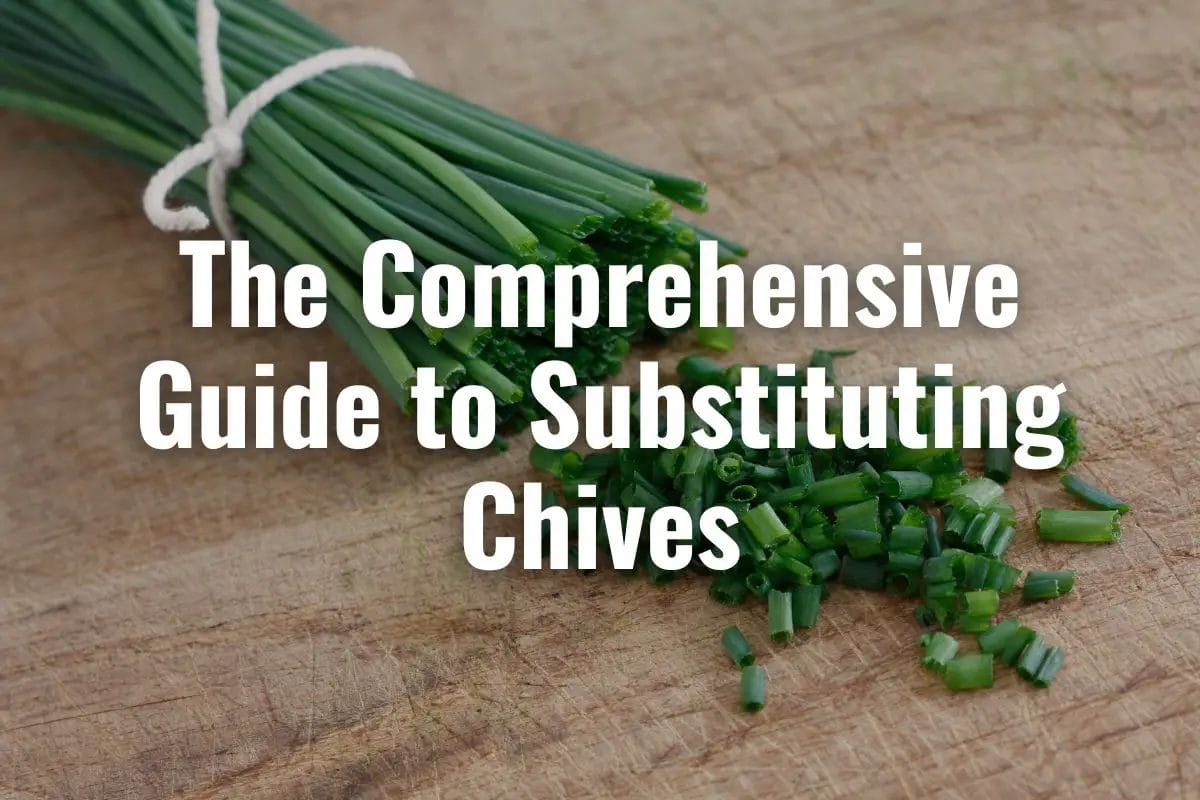When it comes to culinary innovation, finding the perfect substitute for chives becomes an essential skill. Whether you’ve run out of this flavorful herb or need to adapt your recipe to cater to dietary preferences, this comprehensive guide is your ticket to navigate the world of chives substitutes.
Understanding the Role of Chives in Cuisine
Before we dive into the array of potential substitutes, let’s grasp the crucial role chives play in dishes. Chives, a member of the onion family, lend a mild yet distinct onion-like flavor to the plate. Their delicate essence often serves as a garnish, adding a burst of freshness to your culinary creations.
Scallions: Your Top-tier Substitute for Chives
Scallions, also known as green onions, bear a striking resemblance to chives both visually and flavor-wise. They offer a slightly stronger onion flavor, but their tender green parts can serve as an excellent chive substitute, whether you’re making a baked potato, soup, or salad.
Leeks: The Robust Alternative
Leeks are another member of the onion family, packing a punch with their more robust flavor. While they’re thicker than chives, the green part of leeks mimics the chives’ mild essence, serving well in recipes that call for cooked chives.
Garlic Scapes: For an Extra Kick
Garlic scapes, the tender green shoots of the garlic plant, bring a delightful blend of mild garlic and onion flavors. If you’re looking to add a slightly spicy and aromatic touch to your dish, they can serve as a handy chive alternative.
Ramps: The Wild Substitute
Ramps, also known as wild leeks, are renowned for their unique flavor profile: a blend of strong garlic and sweet onion. As a chive substitute, they add an adventurous twist to your culinary repertoire.
Fennel Fronds: A Licorice Twist
Fennel fronds, the dill-like tops of the fennel bulb, provide a hint of sweetness with a light licorice flavor. If you’re seeking a less onion-like substitute for chives, fennel fronds can be your go-to.
Parsley: The Herbaceous Substitute
For those wanting to deviate from the onion family, parsley presents a mild and herbaceous option. While it doesn’t mimic the onion flavor of chives, parsley adds a refreshing note to dishes, aligning well with recipes that use chives for garnish.
Utilizing Dried Herbs: The Pantry Staples
Dried herbs like dried chives, onion powder, and garlic powder can also fill in for fresh chives. Although they lack the vibrant color and texture, they can still impart similar flavors.
Mix and Match: The Art of Blending Flavors
Often, the best substitute for chives doesn’t rely on a single alternative. Mix and match the options based on the specific flavors you want to emphasize. Remember, culinary exploration thrives on experimentation.
In summary, while chives hold a unique place in the culinary world, there are plenty of alternatives waiting to be explored. Whether you opt for scallions, leeks, garlic scapes, ramps, fennel fronds, parsley, or dried herbs, the choice of a chive substitute ultimately hinges on the particular dish and your flavor preferences.
Navigating these substitutes not only enhances your versatility in the kitchen but also opens up a world of flavors you might not have otherwise discovered. So, the next time you’re short of chives or simply want to experiment, you’re well-equipped with a plethora of options.
Chervil: The Delicate Substitute
Chervil, a staple in French cuisine, bears a close resemblance to parsley. It imparts a mild flavor, a blend of anise and parsley, and can be used as a suitable chive substitute in recipes that require a softer taste profile.
Dill: The Aromatic Alternative
Dill, with its feathery leaves and unique flavor, can also serve as a chive substitute. It provides a fresh, slightly sweet, and slightly bitter taste to dishes. While its flavor is distinct, it can complement recipes where the chives’ freshness is more important than their onion flavor.
Tarragon: The Sweet Substitute
Tarragon, known for its slightly bittersweet flavor and anise aroma, offers a distinct alternative to chives. It’s best used in dishes that can benefit from its unique flavor profile. Just remember, a little goes a long way.
Onion Chives and Garlic Chives: Know the Difference
When substituting chives, it’s also important to identify if the recipe calls for onion chives or garlic chives, as these two have different flavors. Onion chives, also known as common chives, have a mild onion flavor, while garlic chives have a subtle garlic flavor. Make sure you choose your substitute accordingly to maintain the intended flavor of your dish.
Growing Your Own Chives: A Long-term Solution
One way to ensure you’re never short of chives is to grow them at home. They’re hardy, require minimal space, and can easily be grown in pots. Plus, homegrown chives are often more flavorful than store-bought ones.
Summing Up Your Substitute for Chives
The world of substitutes for chives is as diverse as it is flavorful. From the onion family members like scallions and leeks to garlic scapes, ramps, and even herbs like parsley, chervil, dill, and tarragon – there’s an abundance of alternatives to explore.
Choosing the right substitute for chives requires understanding the role of chives in your recipe and identifying which flavor profile would serve as the best replacement. Is it the mild onion-like flavor you wish to replace? Or is it the green, fresh garnish that you’re missing?
With this guide at hand, you’re well-equipped to make informed decisions and experiment with flavors, making every meal a unique culinary experience.
Frequently Asked Questions
The best substitute largely depends on the dish and your personal flavor preferences. However, scallions or green onions are often the first choice because they belong to the same family as chives and have a similar mild onion-like flavor.
Yes, you can use dried chives in place of fresh ones. Keep in mind that the flavor intensity may differ, and the texture will not be the same. A general rule of thumb is to use one-third of the amount if you’re substituting dried herbs for fresh.
While both belong to the onion family and have a similar appearance, they are not the same. Green onions have a slightly stronger flavor and a different texture compared to chives.
Garlic offers a distinct flavor compared to chives, so it may significantly alter the taste of your dish. A closer alternative would be garlic chives or garlic scapes, which offer a milder blend of garlic and onion flavors.
Wrap fresh chives loosely in a damp paper towel and place them in a resealable plastic bag in the refrigerator. They can last up to a week if stored correctly.






